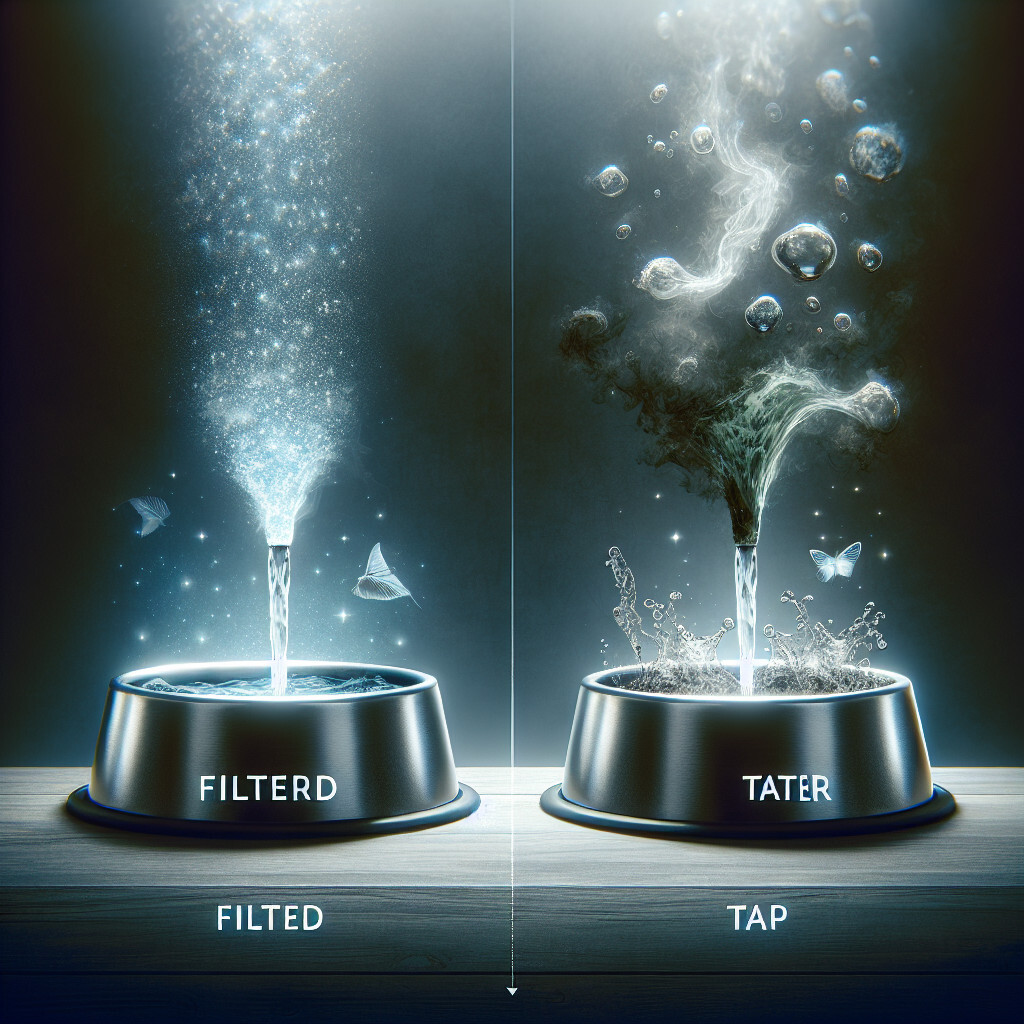-
Table of Contents
“Pure Hydration for Your Pawsome Friend!”
Introduction

Filtered or tap water for dogs refers to the type of water pet owners choose to give their dogs for hydration. While tap water is readily available and convenient, it may contain chemicals or minerals that can be harmful to dogs over time. On the other hand, filtered water removes these potential contaminants, providing a safer and often tastier option for dogs. The choice between filtered and tap water for dogs often depends on the quality of local tap water and the specific health needs of the pet.
Understanding the Differences Between Filtered and Tap Water for Dogs
Understanding the differences between filtered and tap water for dogs is a topic of great importance for pet owners who are committed to providing the best care for their furry friends. The debate over which type of water is best for dogs is ongoing, with some pet owners swearing by filtered water, while others insist that tap water is perfectly fine. To make an informed decision, it is crucial to understand the key differences between these two types of water.
Tap water is the most common type of water that people provide for their dogs. It is readily available, cost-effective, and convenient. However, the quality of tap water can vary greatly depending on the location. In some areas, tap water may contain high levels of minerals, such as calcium and magnesium, which can lead to health issues in dogs if consumed in large amounts over time. Additionally, tap water may also contain traces of chemicals, such as chlorine and fluoride, which are used to treat the water and make it safe for human consumption. While these chemicals are generally safe for humans, they can be harmful to dogs if consumed in large quantities.
On the other hand, filtered water is often considered a safer and healthier option for dogs. Filtered water undergoes a purification process that removes most of the harmful contaminants found in tap water. This process can involve various methods, such as carbon filtration, reverse osmosis, or distillation. The result is water that is free from most chemicals, heavy metals, and bacteria, making it a safer choice for dogs.
Moreover, filtered water often tastes better than tap water. The filtration process removes the chlorine and other chemicals that can give tap water an unpleasant taste. As a result, dogs may be more inclined to drink filtered water, which can help keep them hydrated, especially during hot weather or after vigorous exercise.
However, it’s important to note that not all filtered water is created equal. The effectiveness of the filtration process depends on the quality of the filter and how often it is replaced. Therefore, pet owners who choose to give their dogs filtered water should ensure they are using a high-quality filter and replacing it regularly to maintain the purity of the water.
In conclusion, both tap and filtered water have their pros and cons when it comes to providing hydration for dogs. Tap water is convenient and cost-effective, but its quality can vary greatly, and it may contain chemicals and minerals that can be harmful to dogs. Filtered water, on the other hand, is generally safer and tastier, but it requires a high-quality filter and regular maintenance. Ultimately, the decision between tap and filtered water for dogs should be based on the specific needs of the pet, the quality of the local tap water, and the pet owner’s ability to maintain a water filtration system.
The Impact of Tap Water on Your Dog’s Health
The health and well-being of our beloved canine companions is a top priority for every dog owner. One aspect of dog care that often sparks debate is the type of water we should provide for our pets: filtered or tap water. This article will delve into the impact of tap water on your dog’s health, providing you with the necessary information to make an informed decision.
Tap water is the most common type of water provided to dogs, primarily due to its accessibility and cost-effectiveness. However, the quality of tap water can vary significantly depending on the geographical location and the local water treatment process. While tap water in many areas is perfectly safe for human consumption, it may contain elements that could potentially harm your dog’s health.
One of the primary concerns with tap water is the presence of chlorine. This chemical is commonly used in water treatment to kill bacteria and other harmful microorganisms. While it is generally safe for humans and dogs in small amounts, excessive exposure to chlorine can lead to health issues in dogs, such as skin irritations and stomach problems.
Another potential issue with tap water is the presence of heavy metals such as lead, mercury, and arsenic. These substances can accumulate in your dog’s body over time, leading to serious health problems such as kidney damage, neurological disorders, and even cancer. The risk is particularly high in areas with old plumbing systems, where lead pipes can contaminate the water supply.
Fluoride is another substance commonly found in tap water that can pose a risk to your dog’s health. While fluoride is beneficial for human dental health, it can be harmful to dogs in large amounts. Excessive fluoride intake can lead to skeletal fluorosis, a condition that causes pain and damage to bones and joints.
On the other hand, filtered water can significantly reduce these risks. High-quality water filters can effectively remove chlorine, heavy metals, and other harmful substances, providing your dog with clean and safe water. Moreover, filtered water often tastes better than tap water, which can encourage your dog to drink more and stay hydrated.
However, it’s important to note that not all water filters are created equal. Some filters may not effectively remove all harmful substances, while others may strip the water of beneficial minerals. Therefore, it’s crucial to choose a high-quality water filter that can provide the right balance.
In conclusion, while tap water is a convenient and cost-effective option, it may contain substances that could potentially harm your dog’s health. On the other hand, filtered water can provide a safer and tastier alternative for your canine companion. However, the choice between tap and filtered water ultimately depends on the quality of your local tap water and your ability to invest in a high-quality water filter. As a responsible dog owner, it’s essential to make an informed decision that prioritizes your dog’s health and well-being.
Why Filtered Water is a Better Choice for Your Canine Friend
Water is a fundamental necessity for all living beings, including our beloved canine companions. It plays a crucial role in maintaining their overall health, aiding in digestion, nutrient absorption, and temperature regulation. While many pet owners may not give a second thought to the type of water they provide their dogs, the question of whether to give filtered or tap water to dogs is one that deserves careful consideration.
Tap water, while convenient and readily available, may not always be the best choice for your dog. This is primarily due to the potential presence of contaminants. Tap water can contain various impurities, including heavy metals, chlorine, fluoride, and bacteria, which can be harmful to your dog’s health. Long-term exposure to these contaminants can lead to health issues such as gastrointestinal problems, kidney damage, and even cancer.
On the other hand, filtered water is a safer and healthier alternative. The filtration process removes many of the harmful contaminants found in tap water, providing a cleaner, purer source of hydration for your dog. Filtered water can significantly reduce the risk of potential health problems associated with contaminated water, contributing to the overall well-being of your pet.
Moreover, filtered water often tastes better than tap water. The filtration process removes the chemicals and impurities that can give tap water an unpleasant taste. Dogs, like humans, are more likely to drink water that tastes good. Therefore, providing filtered water can encourage your dog to drink more, ensuring they stay adequately hydrated.
It’s also worth noting that certain breeds of dogs may be more susceptible to the effects of contaminated water. Dogs with a smaller body mass, such as toy breeds, have less body volume to dilute toxins, making them more vulnerable. Similarly, puppies, senior dogs, and dogs with compromised immune systems or pre-existing health conditions may also be at a higher risk. For these dogs, filtered water is not just a better choice, but a necessary one to protect their health.
While the benefits of filtered water are clear, it’s important to remember that not all water filters are created equal. When choosing a water filter for your dog, look for one that removes a broad range of contaminants. It’s also advisable to choose a filter that retains beneficial minerals, as these can contribute to your dog’s nutritional needs.
In conclusion, while tap water may be the more convenient option, filtered water is the healthier choice for your canine friend. It reduces exposure to potentially harmful contaminants, tastes better, and can contribute to better hydration and overall health. By providing filtered water, you’re not just quenching your dog’s thirst, but also taking an important step towards ensuring their long-term health and well-being. After all, our dogs are not just pets, but cherished members of our families, and they deserve the best care we can provide.
Exploring the Benefits of Filtered Water for Dogs
As pet owners, we are constantly seeking ways to improve the health and well-being of our beloved companions. One aspect that is often overlooked is the quality of water we provide for our dogs. While many of us simply fill our dog’s bowl straight from the tap, it’s worth considering the potential benefits of filtered water for our canine friends.
Tap water, while generally safe for human consumption, can contain a variety of contaminants that may not be suitable for dogs. These can include heavy metals such as lead and copper, chemicals like chlorine and fluoride, and even bacteria or parasites. While these contaminants are typically present in small amounts, long-term exposure can potentially lead to health issues in dogs, including digestive problems, skin conditions, and even certain types of cancer.
Filtered water, on the other hand, undergoes a process to remove these contaminants, resulting in a cleaner, safer source of hydration for your dog. There are several types of water filters available, including activated carbon filters, reverse osmosis systems, and distillation units. Each of these works in a slightly different way, but all are designed to remove harmful substances from the water.
One of the primary benefits of filtered water for dogs is improved health. By providing your dog with cleaner water, you can help to reduce their exposure to potentially harmful contaminants. This can lead to better overall health and may even help to extend your dog’s lifespan. Additionally, filtered water often tastes better than tap water, which can encourage your dog to drink more. Proper hydration is essential for a dog’s health, aiding in digestion, nutrient absorption, and temperature regulation.
Another benefit of filtered water is the potential for cost savings. While there is an initial investment in a water filtration system, over time, this can be offset by the savings on veterinary bills. Dogs that drink filtered water may be less likely to develop health issues related to water quality, resulting in fewer trips to the vet and lower healthcare costs.
It’s also worth noting that filtered water is not just beneficial for dogs, but for all members of the household. By investing in a water filtration system, you can improve the quality of water that you and your family drink as well. This can lead to better health for everyone in the home, making it a worthwhile investment.
In conclusion, while tap water is generally safe for dogs, filtered water can offer a number of benefits. From improved health to potential cost savings, there are many reasons to consider making the switch. As always, it’s important to consult with your veterinarian before making any major changes to your dog’s diet or care routine. They can provide guidance based on your dog’s specific needs and health history. However, for many dog owners, the benefits of filtered water make it a clear choice for their canine companions.
Q&A
1. Question: Is it safe for dogs to drink tap water?
Answer: Yes, it is generally safe for dogs to drink tap water as long as it is clean and free from harmful contaminants.
2. Question: Can dogs drink filtered water?
Answer: Yes, dogs can drink filtered water. In fact, it can be beneficial as it removes potentially harmful substances that may be present in tap water.
3. Question: Is there a difference in health benefits between filtered water and tap water for dogs?
Answer: Filtered water can remove harmful substances like lead, chlorine, and bacteria that may be present in tap water, potentially providing a health benefit for dogs.
4. Question: Should I give my dog bottled water instead of tap water?
Answer: It’s not necessary to give your dog bottled water instead of tap water. As long as the tap water is clean and safe, it should be fine for your dog. However, if you’re concerned about potential contaminants, filtered water is a good option.
Conclusion
In conclusion, both filtered and tap water can be safe for dogs to drink. However, if the tap water in your area is known to contain high levels of contaminants or heavy metals, filtered water would be a safer choice for your pet’s health.






